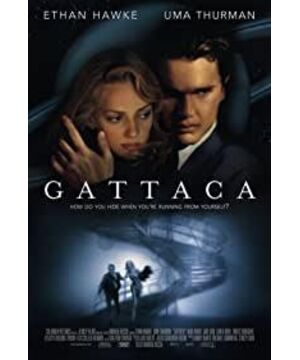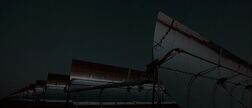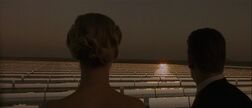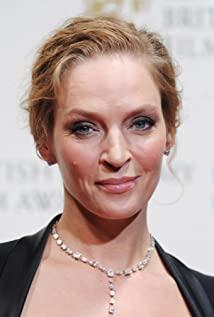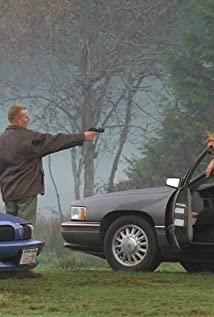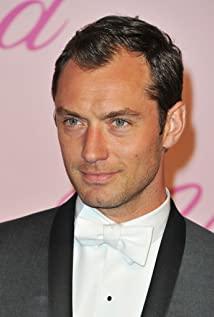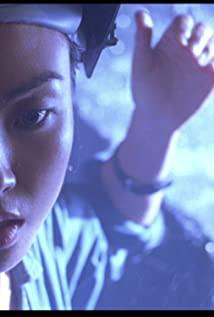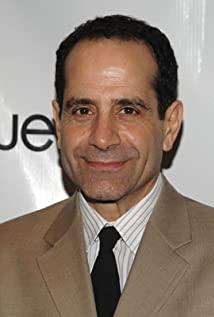Anything that allows us to think beyond ourselves to think about human propositions is never too bad. Gattaca (1997) is one such film. The film is based on the background that genetic engineering is extremely advanced and technology trumps everything, and it fictions a future era where genes determine fate. There, everyone's fate is predestined, known, and meticulously recorded from the moment they are born - including your future height, IQ, probability of disease... and life expectancy. People almost all use IVF to "grow" the next generation of new life: they send sperm and eggs to doctors to detect and screen out the best two, and "modify" genes that may cause diseases; Then they can receive a perfect son or daughter - one with good looks, the right height, a strong heart, and a long life. In short, when they start school and work in the future, when they stand on the testing instruments one by one, their test results will always be satisfactory. In these times, your destiny is written at the moment of birth, and what you do is to get everything smoothly and to verify everything - to verify the series of data on the genetic test report.
Of course, the film will not tell the story of a customized "seed player", because in those times, such people are too common - although because of the superb skills of doctors, the excellent genetic quality of parents and their abilities. Newborns will inevitably have many differences depending on the amount of money paid, but these differences are too small to make for an interesting and shocking story. A smart director wants to talk about the outliers, the minorities, and reflect the whole from these minorities.
On the other hand, we also need to be aware of the director/writer of the film: Andrew Nicol. You may be unfamiliar with this name, but you will never be unfamiliar with the films he has directed or written - for example, Spielberg's "Happy Terminal" was written by him and starred in Nicolas Cage's "Lord of War" Directed by him. More widely known to Chinese movie fans, but also of similar interest to "The Crucible" are "The Truman World" (screenwriter, director Peter Weir), "Time Planning Bureau" (screenwriter, director). Andrew Nicol's output is not high, but his work often has a clever creative point, and then contains a rather shocking thought proposition. "Closer" is no exception, of course.
Vincent, starring Ethan Hawke, is a "blemish man" conceived by both sexes and born naturally. He originally represented the crystallization of a kind of love, but at the moment of his birth, the genetic test report that came out at the same time has put a stop to his life - the probability of neurological disease is 60%, the probability of mania is 42%, and he can't concentrate. 89% chance, 99% chance of heart disease, chance of premature failure, life expectancy of 30.2 years. It was this series of dangerous data that made his father hesitate, and "deducted" the carefully selected name (Anton), and temporarily gave this newly arrived life the name of Vincent. The name "Anton" originated from the father, Antonio Freeman, who had thought about letting his son inherit his name, and now, of course, the father is not satisfied with such a naturally born "blemish person" . As a result, the name was given to Vincent's younger brother-a younger brother who had all the good genes of his parents and was further modified; he was given all the hope and love of his father.
Vincent, the "defective person" with a "stop", did not receive father's love, but began to suffer from social discrimination from all directions, similar to the patriarchal shroud in the earth. Genetic discrimination has become an unspoken rule in all industries. A hair or a little dander you left in the interview waiting area has already revealed all your personal information and life passwords; when you walk into the interviewer's office, you will find his hands I have already taken your genetic test report, and the innocent and ugly expression tells you: the interview is over, you have been rejected.
Vincent "successfully" became a cleaner and had no choice but to get through his days. However, when the launch window of the space center was opened, and the rocket and the spacecraft pierced the sky again and again, the dream of "roaming in space" never faded in Vincent's heart, and it became stronger and stronger. It's not that your talent is not worthy of your dreams, but that the cloud is unreasonably blocking talent and dreams. And you have to achieve your dreams, not only to surpass yourself, but also to fight the world.
The story always has to develop downward, and the restless heart decides to take the risk. Vincent came to the "identity black market" and became a "gene poacher". Jerome (Jude Law) at the Space Center is genetically superior, but he is paralyzed after a car accident - it turns out that it wasn't an accident, but a failed suicide. The two swapped their identities, Jerome lent the gene to Vincent, and Vincent provided Jerome with living expenses.
The cost is of course enormous. Jerome can't move around easily, and hides in the room all day to prepare "gene items" for Vincent. Vincent followed Jerome's style from dressing to publishing, and even had to break his leg bones to increase his height because he was a few centimeters lower. After that, he also needs to carefully rub off the dander on his body every day, blow off the hair on his body, and be careful not to leave any "items" carrying his genetic information in public places, so as not to be seen through his true identity. At the same time, blood sacs are carried to "swipe" the door every day, and urine and blood samples are used for regular or irregular frequent inspections.
Everything is so tense and dangerous, but methodical, until a murder in the space center occurs. Although it has nothing to do with Vincent, it has become the biggest crisis of Vincent's roaming space - and at this time, it is less than a week before Vincent's lift-off, the dream is close at hand, and the crisis is ups and downs. Of course, as a movie, the following story is easy to guess. It is nothing more than that Vincent survived the crisis and finally lifted off smoothly, bringing a touch of relief and moving to all the audience. Therefore, it is unnecessary to go into details.
In fact, the most worth thinking about this film is not the process of murder detection, but the world view setting of the story and what happened after Vincent entered space. The future world of genetic customization, followed by many ancient keywords: technology ethics, humanistic ideals, class solidification, discrimination and inequality, polarization... This film was shot in 1997, 17 years later Going to look at it again today, especially when I think about the current state of Chinese society, always makes people feel embarrassed. It is not difficult to find similar traces of the class solidification and the bottom that sociologists discuss in this film. Vincent is like the young people at the bottom of China, trying hard to realize their dreams, but the rules of reality and unspoken rules never encouraged them and gave them opportunities. There are very few people who take risks and break the rules like Vincent, whether in the film or outside the film. Personal choice can comfort the audience, but not the times.
And when people find out that the "defective person" has entered space on a spacecraft, how will they react? Shocked, exasperated, and then quickly ordered the ship back and brought Vincent to justice; or shocked, ashamed, and on reflection to discover that genetic customization isn't everything? But I don't think they'll choose the latter, because that's too romantic, too tender. Reality is always much crueler and more absurd, and tenderness is usually just a veil. The reality is "The Beginning and End of Jin Funan's Murder Case". After Jin Funan finally waved his sword to resist, he did not retreat from the sea of misery to obtain his own happiness, but decided to lose his life as a solution; How to write" written by the novelist who exclaimed...
This is a science fiction fable. It unfolds on the level of imagination, but it reflects the present and real society of human beings. It has a grand worldview setting, but weaves a fairly small story.
The story is basically limited between the three protagonists played by Ethan Hawke, Jude Law, Uma Thurman and Vincent's younger brother (Anton). In addition, the film adopts a more "cold and dark" style from the way of storytelling to the way of audio-visual presentation, which further contrasts the cruelty of the whole world. The film is not without inspirational and warm moments - the doctor who tested the urine sample saw Vincent's identity but did not expose him, and the female colleague who was also at risk of heart disease did not report Vincent, Vincent The words "because I never save my energy for swimming back" after winning the swimming competition with my brother Anton, these are all warm and inspirational scenes. However, these are only temporary warmth and encouragement for us as the audience. When we see through the veil of tenderness, we will feel colder, tougher, darker and crueler.
And when the mystery of Jerome's lower-limb paralysis was revealed—it wasn't an accident, but the result of a failed suicide—we also learned that those with good genes weren't happy either. They are under another kind of pressure to survive. They must be excellent. Science has already completed the summary of their lives. They must complete the indicators one by one. Also, in order to prove the greatness of science and people's worship of technology is wise and correct . The swimming silver medal Jerome won in the swimming competition became the unsolved mystery of his life and the last straw that broke the camel's back. Fortunately, in the end, he also "dreams come true", escaped a cruel world with his silver medal in the flame of suicide, and returned to his dream home - "People say that every atom of our body was once a star. (Of course, they say every atom in our bodies was once part of a star. Maybe I'm not leaving. Maybe I'm going home.)
It's a happy dream come true, and all fans will be happy for Vincent and Jerome's journey. But we have to understand that this comfort is because of the story in the film, not the reality and the future. As a pessimist, I probably won't believe that human beings can make any reflections and get any enlightenment from the successful launch of the "defective man" Vincent. They will only make stricter rules and make discrimination even more severe. Reasonable and legal. Considering the fact and trend that we worship and use science/technology with a religious fanaticism, facing the future world, I have to say that I lack confidence.
Note 1: The title of the film is not well translated, giving people the feeling of a critical moment. Although it is true that there is an emergency in the film, the main and profound theme of the film is not here. At the same time, the English name of the film, Gattaca, contains four letters of ATCG. In the credits after the film, these four words in all words are also highlighted in blue, because DNA is composed of these four deoxynucleotides. .
Note 2: Although the poster of the film has the words "There is no gene for the human spirit", I am not very willing to interpret this film from the perspective of "soul/spirit without genes". It is more meaningful to think from an ethical point of view.
View more about Gattaca reviews


